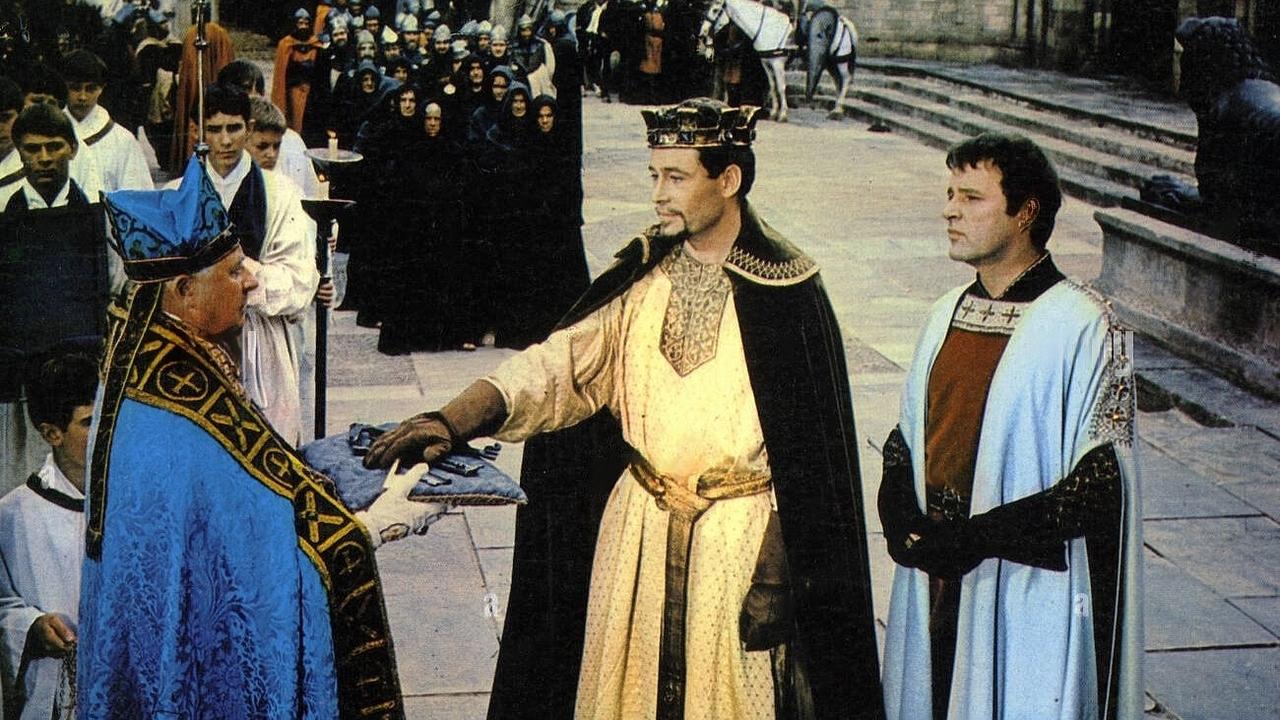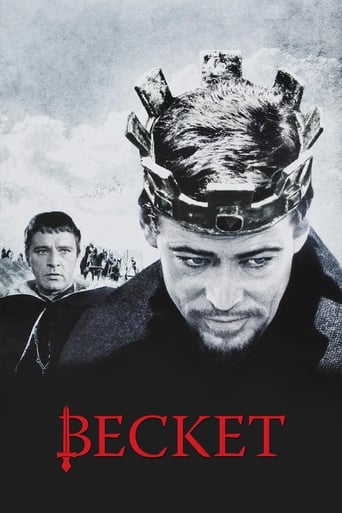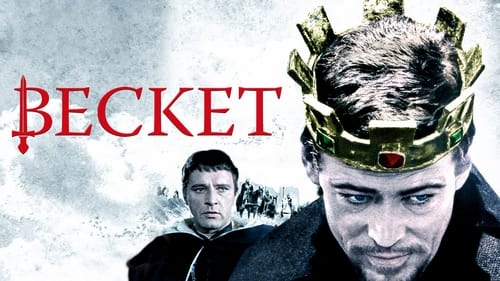



Purely Joyful Movie!
I like Black Panther, but I didn't like this movie.
View MoreIt's entirely possible that sending the audience out feeling lousy was intentional
View MoreThis story has more twists and turns than a second-rate soap opera.
View MoreWe have the clash of the secular world with the world of intractable religion represented here. Henry II, played by Peter O'Toole, clashes with his friend, Thomas a Beckett, played by Richard Burton. The issue is Henry's need to have dominance over the church. He feels he can parlay his friendship with Beckett into favors from the big church. Instead, he finds himself threatened with excommunication. Beckett, the ultimate moral man choose God over his friend, and like the true martyr, puts his life on the line for his faith. The scene where the two men meet on horseback on the beach is one of those we remember forever. We already know the story, so there are no surprises. All that is left is to question the decision that Henry makes. This is a classic and deserves a lot more attention.
View MoreIt's a sad story of Henry II (O'Toole) and Thomas Becket (Burton) who begin as friends and end as enemies. No one likes to see a friendship die, let alone the Archbishop of Canterbury.The performances -- it's hard to imagine how they could be topped. O'Toole is a king, ruthless in his pursuit of power and sex. And sometimes he lapses into childishness and seeks reassurance in Becket's bed, with no homosexuality implied. Protocol is observed though. The king calls his friend "Thomas," while his friend calls the king "My prince." No doubt about who's superior to whom around here., Burton begins as his reticent knight and valet, more sensible, as if he actually had frontal lobes, and more austere. It's made clear that he is a Saxon, while O'Toole's king is a French Norman, and that Burton takes care of the king properly. But there is a void in Burton because he seems to lack passionate conviction. He doesn't seem to believe in anything. He takes care of whatever business is at hand. And when he's promoted to Chancellor of the Exchequer or Minister of Finance or Order of the Steam Bath or whatever it is, he turns his attention to managing the king's everyday financial affairs as well as giving him advice.The king is a Norman and the chancellor is a conquered Saxon, and thus natural enemies. This is only one hundred years after the Battle of Hastings when William the Conqueror invaded England and squashed the Saxons mercilessly. The French were the nobility and the Saxons were the churls in the barnyard, which is why a pig is a swine in the stye but becomes pork when it reaches the table.So O'Toole has his doubts about Becket, but he nevertheless trusts him enough to appoint him Archbishop of Canterbury so that he will put an end to the braying of the church, a rival for the king's power. It's a big mistake for O'Toole. Suddenly the void within Becket is filled; he has an epiphany and becomes a true religious and an obstacle to the king. That was a mistake for Burton, one he doesn't survive. The first problem arises when Burton, now Archbishop, is informed that a priest has been accused of "debaucherie" and is about to be dragged before a civil court instead of being tried by the church. Later the priest is killed while trying to escape. These sorts of jurisdictional conflict will crop up from time to time. That's why Guantanamo Bay and its prison are so nettlesome. In the case of the priest, both Becket and the king become intractable, neither willing to compromise or budge an inch. That crops up too.Neat, the way "command pressure" is expressed. O'Toole wants Burton dead but he never orders it. Instead, in a painful moan, he asks, "Will no one rid me of this meddlesome priest?" His cronies interpret this literally, not as simple rhetoric. The job gets done and the king retains his "plausible deniability." The musical score is pedestrian. When the nobles go a-hunting, we hear an exciting hunting melody. When a would-be assassin is sneaking up on Burton, we hear tremolo violins, just as we would in an Abbott and Costello movie. The cathedral has quadraphonic "Dies Irae." When O'Toole enters a conquered French city in a triumphal march, there is a triumphal march.And, near the beginning, when the two friends are out wenching, we only see O'Toole wenching. Burton play the lookout. We never see Burton drunk or humping. Probably because it would be inelegant to suggest that the future head of the church in England would ever experience such goaty desires. Yet, Becket, playing the innocent Archbishop, may not be so innocent. The Pope sends him on a retreat to a monastery in France. Becket now is dressed like an ordinary monk and works as a field hand. He claims to be happy, but, alone, he wonders if God hasn't made his life "too easy." Maybe, after all, God wants him to go back to England and challenge the king openly. You know, exercise a little AUTHORITY again, become a celebrity once more, instead of hustling up a sweat feeding the cattle. It's a richly textured play. No one is unambiguous. At their last meeting, Henry begs Becket to be his friend again.Frankly, I liked the earlier Becket, when he was a roisterer and an empty cynic. As Archbishop he becomes stiff and unyielding, his speeches turn pompous, he rolls his eyes heavenward too often. And Burton has a quirk I'd never noticed. He pauses before delivering the last word or two of a dramatic sentence. "God will hold us in his hand . . . forever." John Wayne did something similar. "I'd better go . . . back and see to the . . . passengers." And, "Did you . . . picket this area?" In Burton's case the pauses were the result of deliberation; in Wayne's, he may just have been out of breath.
View MoreI had heard of this film for years and finally got around to watching it. I can't believe this film has an 8.0 score. It drags incessantly and it wastes the talents of Burton and O'Toole. As others have stated, the pacing is horrid. This film could have been shorter by 30 minutes.Mind you, I love old films especially "A Man for All Seasons" which is my favorite of all time. The plot of "Becket" resembles that of AMFAS, but the latter does it much better. "Becket" is a drama that aspires to be an epic, whereas AMFAS is comfortable in itself.O'Toole gave his usual sublime performance as Henry II. He was as good as he was in "The Lion in Winter". Burton was good although his character took himself too seriously. Save yourself some time and watch "A Man for All Seasons" instead.
View MoreBECKET is a film that seeks to explore the friendship and eventual enmity that existed between Henry II and Thomas Becket, two of the most famous characters in British history. Based on a play and filmed with an exemplary cast, it's a fine example of the kind of serious, old-fashioned, historical drama they don't make much of anymore.The film is inevitably dominated by the presence of two acting heavyweights in the form of Peter O'Toole and Richard Burton. O'Toole is very good as the fey, fun-loving king, but Burton is even better as the religious man suffering a crisis of conscience.The film is slow-moving and long-winded, but somehow it still works. The history is interesting, the scene-setting helps to add a real air of authenticity, and it's great seeing familiar faces (Gielgud, Phillips, Wolfit) fleshing out the cast.Watch for the final encounter between king and subject on the beach. Possibly the most beautifully filmed moment of cinema I've seen - check out the sky and the sea, the costumes and the hollow faces of O'Toole and Burton. Cinema really doesn't get any better than this...
View More